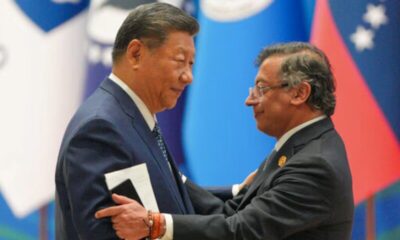Former Colombian President Álvaro Uribe Submits Resignation from Senate Amid Investigation
Álvaro Uribe, a former president of Colombia and arguably the most influential politician in the country, announced his resignation from the Senate amid an ongoing investigation that includes allegations of witness tampering.
As this situation plays out, Uribe, who has been called for questioning by the Supreme Court, said today that he will have to focus on his defense and doesn’t believe he can fulfill his obligations as a legislator at the same time.
“I feel morally impeded to be senator,” stated Uribe on Twitter. “I will submit my resignation letter so that my defense does not interfere with the work of the Senate.”
Uribe, who served as head of state from 2002 to 2010, has been surrounded by allegations of serious criminal activity for more than three decades. The current inquiry from the Supreme Court centers on claims that Uribe may have tampered with witnesses who were reportedly prepared to testify against him.
The case has roots that date back six years ago, when Uribe accused a Colombian senator, Ivan Cepeda, of bribing witnesses and generally concocting a conspiracy to tie the ex-president to paramilitary-related crimes. The Supreme Court eventually dismissed Uribe’s accusations against his colleague and later began probing into whether it was in fact Uribe who has been illicitly tampering with justice through witness manipulation.
Uribe maintains that his “enemies,” including journalists, are continuing to plot against him and deceive the courts. He claims that they have “paid witnesses,” and he has called for the resignation of the justice official who allegedly supplied these journalists with information from the court.
During his eight years as president, Uribe gained a mass of lifelong ardent supporters for his role in improving security in the country by launching major military offensives against the guerrilla groups that were plaguing the nation. Many of his followers, known as Urbistas, see him as something of a savior who helped rescue a conflict-ravaged country that was on the brink of failure at the turn of the century.
But during his time in office, Uribe was also embroiled in ongoing scandal about the tactics used, most notably for the “Falsos Positivos” tragedy in which military personnel carried out widespread extrajudicial executions while fraudulently claiming the victims were rebel combatants killed legitimately in combat.
Serious allegations against Uribe date back even before his presidency, to his time as governor of Antioquia, where a series of paramilitary massacres occurred in the 1990s. Human rights activists have claimed the future president either condoned or instigated unsanctioned incidents that left many dead. His brother, Santiago Uribe, has faced formal charges of participating in paramilitary activity.
Since leaving the presidency, Uribe has served in Senate and been one of the most prominent voices in the nation. He successfully endorsed his former defense minister, now President Juan Manuel Santos, to succeed him in office in 2010, but he later broke with his former ally over irreparable disagreements concerning the nature of the peace negotiations the government launched with the Revolutionary Armed Forces of Colombia (FARC) guerrilla group.
Uribe then led the “No” campaign that temporarily blocked the finalized peace accord between the government and the rebels — an opposition wave of support that transitioned into the campaign that backed rightwing President-Elect Iván Duque to an electoral victory in June. Duque will take office as president in August.
“We express our solidarity with ex-President Uribe and his family at this time and are sure his honor and innocence will prevail,” said Duque, who will take office in August, to reporters today, as reported by Reuters.
Leftist Senator Gustavo Petro, the man who Duque beat in the June run-off election for the presidency, has claimed that Uribe has ulterior motives for stepping down from the Senate.
“The resignation of Álvaro Uribe from the Senate is to evade investigation,” tweeted Petro.
The political opponent’s rationale is that the Supreme Court is charged with investigating elected officials, but Uribe’s case would potentially be heard by a lower court if he became an everyday citizen. Because of this, Petro added that, “I ask the Senate not to accept the resignation of Senator Uribe.”
























